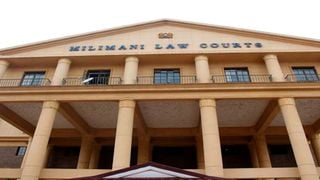
Milimani Law Courts in Nairobi. The Executive has vestiges of imperialism that must be sheared. The Judiciary needs radical surgery.
| File | Nation Media GroupOur Columnists
Premium
Why amend 2010 Constitution
Although we share a strong background in human rights law, I rarely agreed with Prof Githu Muigai when he served as Attorney General.
But his recent contribution on the on-going Bomas talks were erudite, and must be taken seriously by those of us who understand the predicates for nation building in the context of an African post-colonial state.
My learned brother was refreshingly clear, insightful, and without hubris. He was the quintessential scholar – Prof Muigai – without the accoutrements of power. I want to state before discussing the substance the bottom line upfront – I agree with most of his pithy suggestions.
The bottom line is that our government is terribly bloated and constipated, and we must drastically downsize it.
There is no doubt that the 2010 Constitution is among the best progressive documents of its type in the world. It’s among the few “woke” constitutions in the world rivalled, I believe, only by the 1996 South African constitution, its spiritual and ideological parent.
We must, however, remember that the charter was gerrymandered by the mendacity and narrow interests of Kenya’s craven political elite. Even so, the document is still admirable. But the relationship between the Constitution and the people is akin to a marriage.
You only really get to see your spouse’s real warts several years into the marriage. At that point, you can decide either to head for the exit, or renegotiate the marriage contract.
Methinks 13 years on, Kenyans know what’s working in their marriage with their constitution, and what’s gone awry.
They know where the shoe is pinching them, and they understand well the congenital defects in it, and how they can be cured, or mitigated. My view is that some of those defects ought to be excised like an incurable limb that’s infected with gangrene.
If we don’t act with courage, the gangrene may spread to the entire body politic and consume us all. That’s why the Kalonzo Musyoka-Kimani Ichung’wah Bomas dialogue must result in substantive reforms to cure what ails Kenya’s fledgling democracy.
The cure must go beyond electoral issues to the deep inequities and dysfunctions that pose an existential threat to Kenya.
In my view, there should two overarching objectives to the Bomas talks. The first is to reimagine the state so as to give it a robust legitimacy among the people. Otherwise, our democratic experiment will be stillborn.
The second is to create a just society where every person will have the opportunity to develop their full potential. We want a society that’s empathetic, not one of antipathy. We don’t want a society of six dollar billionaires and 60 million paupers.
That means we must introduce real reforms and legal hygiene in the three co-equal branches of government. The Executive has vestiges of imperialism that must be sheared. The Judiciary needs radical surgery and chunks of Parliament must be amputated.
Kenya’s county architecture must be rethought. While it’s the best innovation in the Constitution, it’s diseased in too many places. First, our counties are “tribal” following the colonial policy of divide and rule. Each “tribe” damn near has its own county.
That’s not how to build a nation from over 40 disparate sub-nations. Amalgamate the counties into 10 to create multiethnic units that can be economically viable. Why should Embu or Tharaka Nithi be counties? Or Vihiga, Lamu, Kirinyanga, Nyandarua, Nyamira, or Migori? You can think of all the others that make absolutely no sense. Create 10 large units and raise funding to them to at least 50 per cent. Then cut MCAs to a manageable four a county.
Of the four MCAs per county, two should be men and two women. Let’s use a similar meat cleaver – not a scalpel – for the Parliament. First, abolish the Senate. While there are several good men and women there, the Senate has failed to vindicate its existence in the Constitution.
It’s an empty husk full of barracudas. Let’s reduce MPs in the National Assembly, as Prof Muigai argued, to 200. That will be 20 MPs elected from the 10 counties – 10 men and 10 women from each county. That will erase the issue of gender under-representation and put men and women at par. Most MPs, except a handful, have failed to honorably acquit themselves. They get elected to fleece the public.
The Judiciary needs to be cleaned out and subjected to rigorous wealth declaration processes to eradicate all the thieves in it. I believe more than 80 per cent of judicial officers are corrupt. The Executive still suffers from an imperial hubris.
We need to lower the constitutional threshold for impeaching both the President and the Deputy President. We must separate – excise – the Deputy President from the President and make it easier for the President to remove his deputy.
These devices will make the Executive more response to the people. Finally, the Bomas talks must create the office of the Leader of Opposition either in or outside Parliament.
- Makau Mutua is SUNY Distinguished Professor and Margaret W. Wong Professor at Buffalo Law School, The State University of New York. @makaumutua.





